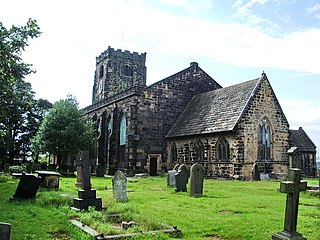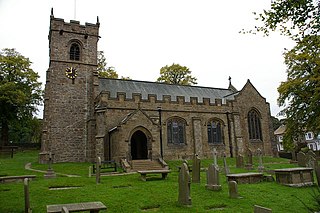
St Peter's Church is in the village of Heysham, Lancashire, England. It is recorded in the National Heritage List for England as a designated Grade I listed building. It is an active Anglican parish church in the deanery of Lancaster, the archdeaconry of Lancaster and the diocese of Blackburn.

St Wilfrid's Church is in Main Street, Melling, Lancashire, England. It is recorded in the National Heritage List for England as a designated Grade I listed building, and is an active Anglican church in the united benefice of East Lonsdale, the deanery of Tunstall, the archdeaconry of Lancaster and the diocese of Blackburn. Its benefice is combined with those of St Peter, Leck, St John the Baptist, Tunstall, St James the Less, Tatham, the Good Shepherd, Lowgill, and Holy Trinity, Wray.

St Wilfrid's Church is an Anglican church in the village of Ribchester in Lancashire, England that is situated close to the site of a Roman fort. It is an active parish church in the Diocese of Blackburn. It is recorded in the National Heritage List for England as a designated Grade I listed building.

The Church of St Mary and All Saints is an Anglican church in the village of Whalley, Lancashire, England. It is an active parish church in the Diocese of Blackburn. A church probably existed on the site in Anglo-Saxon times and the current building dates from the 13th century. It is recorded in the National Heritage List for England as a designated Grade I listed building.

The Church of St Leonard the Less is an Anglican church in the village of Samlesbury, Lancashire, England, situated close to the banks of the River Ribble. It is an active parish church in the Diocese of Blackburn. It dates predominantly from 1558, with a tower added 1899–1900, and is protected as a Grade I listed building.

St Cuthbert's is an Anglican church in Lytham, Lancashire, England. It was built 1834–1835, replacing a previous church on the same site. It is an active parish church in the Diocese of Blackburn. Since 1971 it has been designated a Grade II* listed building.

St Leonard's Church is an Anglican church in Walton-le-Dale, Lancashire, England. It is an active parish church in the Diocese of Blackburn and the archdeaconry of Blackburn. In 1950 it was designated as a Grade II* listed building. Parts of the church date from the 16th century and the nave and transepts were rebuilt in the early 20th century.

St Anne's Church is an Anglican church in St Annes-on-the-Sea, a town on the Fylde coastal plain in Lancashire, England. It is an active Church of England parish church in the Diocese of Blackburn and the archdeaconry of Lancaster. It is recorded in the National Heritage List for England as a designated Grade II listed building.

St Helen's Church is an Anglican church in the village of Churchtown in Lancashire, England. Historically, it was the parish church of Garstang; today, as Garstang is split into more than one ecclesiastical parish, St Helen's parish is Garstang St Helen (Churchtown). It is in the Diocese of Blackburn. It has been designated a Grade I listed building by English Heritage. St Helen's is known as the "cathedral of The Fylde".

St Cuthbert's Church is an Anglican church in the English market town of Darwen, Lancashire. It is an active parish church in the Diocese of Blackburn and the archdeaconry of Blackburn. The church was built 1875–1878 by Paley and Austin. It has been designated a Grade II listed building by English Heritage.

St Thomas' Church is a Church of England church in Garstang, a market town in Lancashire, England. It is an active Church of England parish church in the Diocese of Blackburn and the archdeaconry of Lancaster. The church was built in 1770 as a chapel of ease to St Helen's Church in nearby Kirkland and was later assigned its own parish. It is recorded in the National Heritage List for England as a designated Grade II listed building.

St Andrew's Church is an Anglican church in Leyland, Lancashire, England. It is an active Anglican parish church in the Diocese of Blackburn and the archdeaconry of Blackburn. The church is recorded in the National Heritage List for England as a designated Grade II* listed building.

Holy Trinity Church, is in the village of Bolton-le-Sands, Lancashire, England. It is an active Anglican parish church in the deanery of Tunstall, the archdeaconry of Lancaster, and the diocese of Blackburn. Its benefice is united with that of St Mark, Nether Kellett. The church is recorded in the National Heritage List for England as a designated Grade II* listed building.

St Wilfrid's Church is an Anglican church in Halton-on-Lune, a village in the English county of Lancashire. It is an active parish church in the Diocese of Blackburn and the archdeaconry of Lancaster. Halton may have been the site of an ancient Anglo-Saxon minster. Of the current structure, the tower dates from the 16th century and the remainder was built 1876–77 by Paley and Austin. The church is recorded in the National Heritage List for England as a designated Grade II listed building.

St Michael's Church is located in the settlement of Whittington, Lancashire, England. It is an active Anglican parish church in the deanery of Tunstall, the archdeaconry of Lancaster and the diocese of Blackburn. Its benefice is united with those of St John the Evangelist, Gressingham, St Margaret, Hornby, and St John the Baptist, Arkholme. The church is recorded in the National Heritage List for England as a designated Grade II* listed building.

St Peter's Church is in the village of Leck, Lancashire, England. It is an active Anglican parish church in the deanery of Tunstall, the archdeaconry of Lancaster and the diocese of Blackburn. Its benefice is united with those of St Wilfrid, Melling, St John the Baptist, Tunstall, St James the Less, Tatham, the Good Shepherd, Lowgill, and Holy Trinity, Wray, to form the benefice of East Lonsdale. The church is recorded in the National Heritage List for England as a designated Grade II listed building.

St Bartholomew's Church is in the village of Chipping, Lancashire, England. It is an active Anglican parish church in the deanery of Whalley, the archdeaconry of Blackburn, and the diocese of Blackburn. Its benefice is united with that of St Michael, Whitewell. The church is recorded in the National Heritage List for England as a designated Grade II* listed building.

St Mary's Church is in St Mary's Street, Preston, Lancashire, England. It is a redundant Anglican parish church, and was converted into a conservation centre in 2006. The church is recorded in the National Heritage List for England as a designated Grade II listed building.

Holy Trinity Church is in Accrington Road, Burnley, Lancashire, England. It is a redundant Anglican parish church, and is recorded in the National Heritage List for England as a designated Grade II listed building. Holy Trinity is a Commissioners' church designed by Lewis Vulliamy in Early English style. The church was extended in 1871–72, but closed in 1990, and has been converted into flats.

St Leonard's Church is in the village of Downham, Lancashire, England. It is an active Anglican parish church in the diocese of Blackburn. The tower dates from the 15th century, and the rest of the church was rebuilt in 1909–10. The church is recorded in the National Heritage List for England as a designated Grade II* listed building.




























